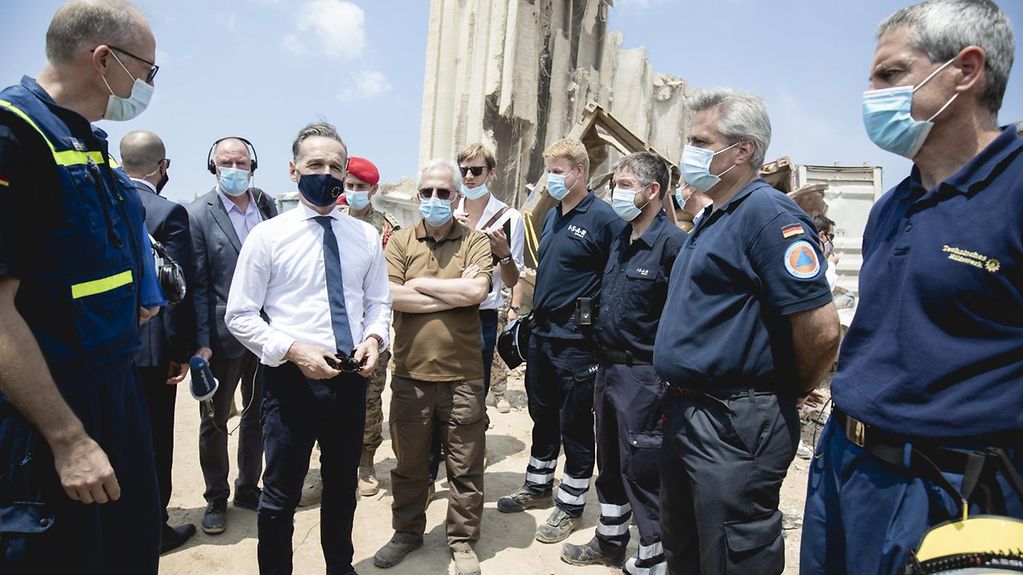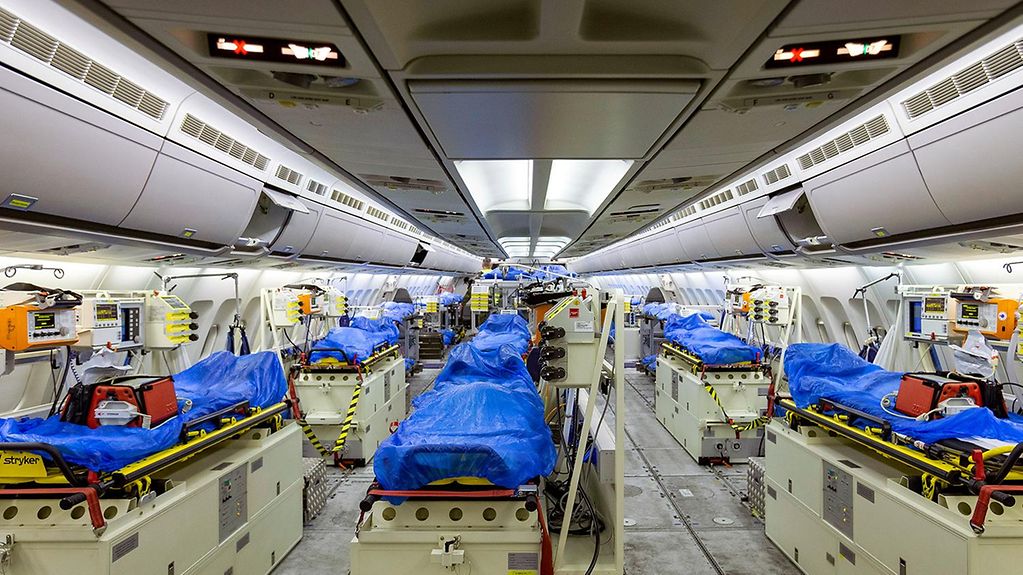Explosion in Beirut
One week after the devastating explosions in Beirut, Federal Minister for Foreign Affairs Heiko Maas has flown to Lebanon, to gain a first-hand impression of the situation on the ground. He thanked relief workers for their efforts and pledged Germany’s support.
3 min reading time

Federal Minister for Foreign Affairs Heiko Maas visits the epicentre of the explosion in Beirut's port area.
Photo: Xander Heinl/photothek.net
"The scale of the devastation is almost inconceivable," declared Federal Minister for Foreign Affairs Heiko Maas in Beirut’s port area, where he was finding out about the situation and the consequences of the disaster.
On 4 August massive explosions shook the Lebanese capital Beirut, causing widespread damage across the city. The energy released by the explosion was equivalent to an earthquake measuring 4.5 and was felt more than 250 km away in Cyprus.
Four million euros in emergency aid handed over
Germany has pledged the country a total of 21.8 million euros in emergency aid. Heiko Maas handed over the first four million euros to ensure, as he said, that "the money gets where it is really needed". In Beirut, he met with representatives of the Lebanese Red Cross, to discuss how the money pledged by Germany and other states can be put to the best use.
"At the moment we first want to help alleviate the suffering here, and ensure that everything that has been destroyed is rebuilt as swiftly as possible," Heiko Maas continued.
Radical reforms needed
In Beirut, protests against the country’s political leaders continue although the government has resigned. Heiko Maas spoke with civil society representatives about the future of the country and about reconstruction following the explosion. The country urgently needs rapid economic reforms, he said. The precondition is that international assistance continues in the medium and long term.
Last Sunday the Federal Minister for Foreign Affairs said, "Without urgently needed reforms there can be neither sustainable change nor stability – and that is exactly what the Lebanese people are rightly demanding. Individual interests and old conflict lines must be overcome and the good of the entire population elevated to top priority."
International donor conference
Last Sunday at the international pledging conference hosted by France, the German government announced that German aid would be topped up, in order to alleviate acute suffering in Lebanon. Germany will provide another 20 million euros from its humanitarian aid and development cooperation funds. This will supplement the sum of 1.5 million euros that the German government provided for emergency measures immediately after the explosion in Beirut.
At the pledging conference for Lebanon a total of 252.7 million euros was raised. The European Commission pledged over 33 million euros, financed by member states. Some of this sum is to be used to provide medical equipment.
THW and Bundeswehr deployed
Following the disastrous explosions in the port of the Lebanese capital Beirut on 4 August, the German government dispatched relief specialists from the Federal Agency for Technical Relief (THW) and Bundeswehr troops to the Lebanese capital to help relief efforts. The majority of the rapid deployment unit for overseas rescue (SEEBA) has already returned to Germany. The THW forces remaining in Beirut are assessing the stability of damaged buildings and playing an advisory role in crisis coordination for the German Embassy.
The Bundeswehr’s "flying intensive care unit" (StratAirMedEvac – strategic patient transport) is still ready to deploy from Köln-Wahn airport. It can transport up to 44 patients lying down, and has space for up to six patients in need of intensive care. The MedEvac was originally intended to fly injured soldiers out of crisis-affected regions for medical care. Meanwhile, a mobile medical unit is on call at Leer in North-West Germany. It can be deployed within 96 hours if needed. The mobile medical unit with ten beds provides initial medical care for patients.

The StratAirMedEvac (strategic patient transport) can transport up to 44 patients lying down, and can carry up to six patients in need of intensive care.
Photo: Bundeswehr/Kevin Schrief
Support through the EU’s Civil Protection Mechanism
Janez Lenarčič, the EU’s Commissioner for Crisis Management, has informed member states that the EU’s Civil Protection Mechanism has been activated in response to a request by the Lebanese authorities. The mechanism coordinates the relief supplies and services of member states offering support in a crisis. In addition, the European satellite Copernicus is being used to establish the scale of damage.
The devastating explosion in Beirut’s port area is a huge challenge for Lebanon, not least in terms of addressing the immediate humanitarian crisis. The country was already in a precarious state before the disaster. It is facing a serious economic crisis and has been hard hit by the COVID-19 pandemic.